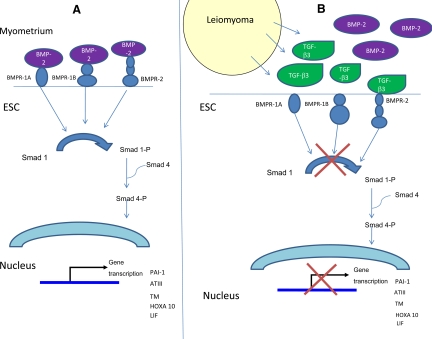Fig. 9.
Schematic representation demonstrating the effects of TGF-β3 on decidualization and hemostasis. A, In the non-leiomyomatous uterus, ESC respond to BMP-2 stimulation resulting in decidualization. To allow normal menstrual blood flow, ESC also make factors that contribute to efficient interruption of the coagulation cascade. These include ATIII, an inhibitor that neutralizes thrombin. ESC also express TM, a cellular receptor that catalyzes the activation of protein C by thrombin. u-PA is a fibrinolytic agent that is expressed by endometrial tissue and has been shown to increase in normal premenstrual and menstrual endometrial tissue. PAI-1 modulates the activity of u-PA, and higher levels are normally expressed in menstrual phase endometrium. B, In the presence of leiomyoma, excess TGF-β3 binds to BMPRs, resulting in their down-regulation, BMP-2 resistance, and thus, impaired decidualization. Excess TGF-β3 also impairs the production of PAI-1, ATIII, and TM in leiomyoma-associated ESC, resulting in defective hemostasis.

